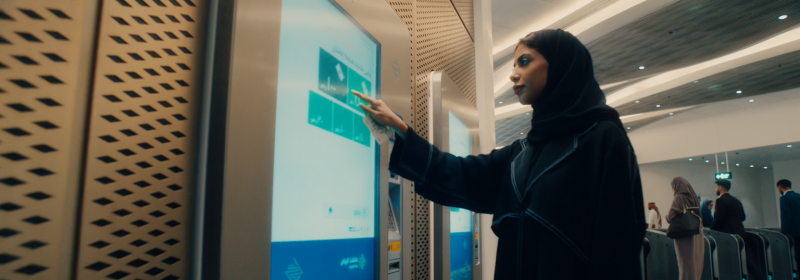- Indra’s automatic ticket vending machines and access control mechanisms are now operating on the first three lines of this key infrastructure for the Saudi capital. They are also being incorporated into the wider Riyadh Public Transport (RPT), as part of the bus network set to facilitate integrated and intermodal journeys
- Indra has equipped its sales devices with a look and usability similar to that of a smartphone. To minimize the feeling of a barrier, glass was used for the access controls, in addition to technologies being incorporated for direct validations with a bank card (EMV), cell phone or smartwatch
- With the integration of cutting-edge technologies at the heart of Riyadh’s advanced public transport network, Indra is proud to contribute to the promotion of urban, intermodal and sustainable mobility for the city's eight million inhabitants

Indra’s ticketing technology, one of the most advanced on the market, is now in operation on the first three recently-opened lines of the Riyadh Metro system. In the coming months, it will extend to the other three lines, with a full network spanning 176 km, across 85 stations.
Indra’s technology is now in operation on the fleet of over 800 buses, the conventional bus stops and the exclusive Bus Rapid Transit (BRT) lines around the city, as it also forms part of the 266-million-euro contract awarded to the company to implement its automatic ticketing and access control solutions throughout Riyadh’s public transport network.
The new metro equipment is now being incorporated into the central system that serves the bus network, in such a way that it provides passengers with an integrated and intermodal end-to-end journey with a single transport ticket.
The new information and ticket vending machines installed throughout the Riyadh Metro network are an innovative solution that Indra has developed specifically for the project, with the aim of providing users with an unrivaled travel experience. Designed with an avant-garde aesthetic and usability, similar to that of a smartphone, the technology is equipped with a touch screen that enables users to interact seamlessly and access information such as maps, timetables and multimedia content.
As for the access control mechanisms, they reduce the feeling of a barrier, thanks to the use of transparent elements and the fact that they allow tickets to be validated with a travel card, cell phone, bank card (EMV) or smartwatch.
Meanwhile, the equipment designed by Indra for the BRT and conventional bus stops is capable of withstanding the climatic conditions of Riyadh, as it is resistant to temperatures above 60ºC and protected against dust and water.
Sustainable mobility with a social impact
With its advanced technology for the public transport network recently inaugurated in Riyadh, Indra is focusing on guaranteeing the very best traveler experience and contributing to the project’s significant impact on its the quality of life of all residents, including by reducing traffic congestion and polluting emissions. The Kingdom’s commitment to providing the capital city with an advanced, intermodal and sustainable urban mobility network will enable its nearly eight million citizens to move with greater ease, comfortably and safely around an area covering 1,800 km2.
Indra’s Mobility business has been awarded another transformative project this year for the management of the comprehensive ticketing system for light rail, buses and the national rail network in Ireland, as well as the future Dublin Metro, thus confirming its ability to undertake complex projects.
Indra is one of the world’s leading ticketing companies, with major success stories in cities such as Madrid, St. Louis, Lisbon and Amsterdam. It also has a unique track record in Mobility, having undertaken over 2,500 projects worldwide, and it has become one of the most important technological companies in the railroad sector, with end-to-end solutions that have already been or are being deployed in projects for the Spanish rail network, the Mecca-Medina high-speed line in Saudi Arabia and the Lithuanian rail network, among many others.